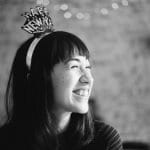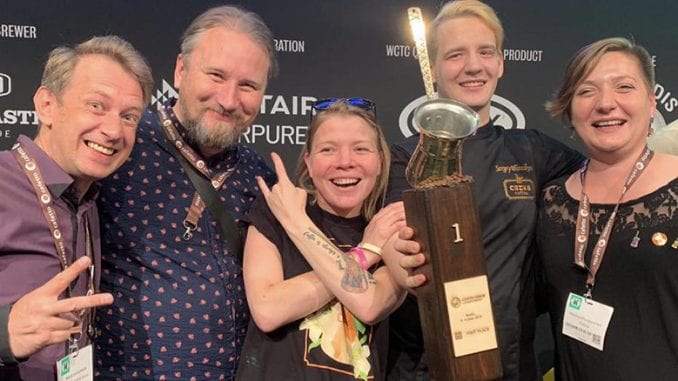
We chat with the cezve/ibrik winner about his award-winning routine and the promising future he sees for the brewing device.
BY KATRINA YENTCH
BARISTA MAGAZINE ONLINE
Cover photo courtesy of Sergey Blinnikov
From the editor: This year, the World Coffee Championships in Berlin crowned four new champions, and we have been chatting with them at Barista Magazine Online. Our first installment of this four-part series can be found here with 2019 World Cup Tasters champ Daniel Horbat, and we also interviewed 2019 World Coffee In Good Spirits champ Dan Fellows. Today, we continue our conversations by featuring Russia’s Sergey Blinnikov, the champion of the World Cezve/Ibrik Championship.
Sergey Blinnikov, winner of the 2019 World Cezve/Ibrik Championship, remembers his first cup of specialty coffee, which he had as a 16-year-old college student. “It was a natural El Salvador, and it was love at first sight,” he recalls. Five years later, Sergey has explored this romance as head barista of Cezve Coffee in Moscow, and as a World Coffee Championships competitor.
It only took a second year of competing to steal the champion title (he earned third place on his first try), and Sergey has plans to further advance his beloved cezve as a go-to method in the specialty-coffee scene. While it has been a longtime staple in the World Coffee Championships arsenal (as early as 2010), its use in specialty cafés is still growing.
In part one of our interview, we talk to Sergey about his award-winning routine, his experience with the cezve, and more.
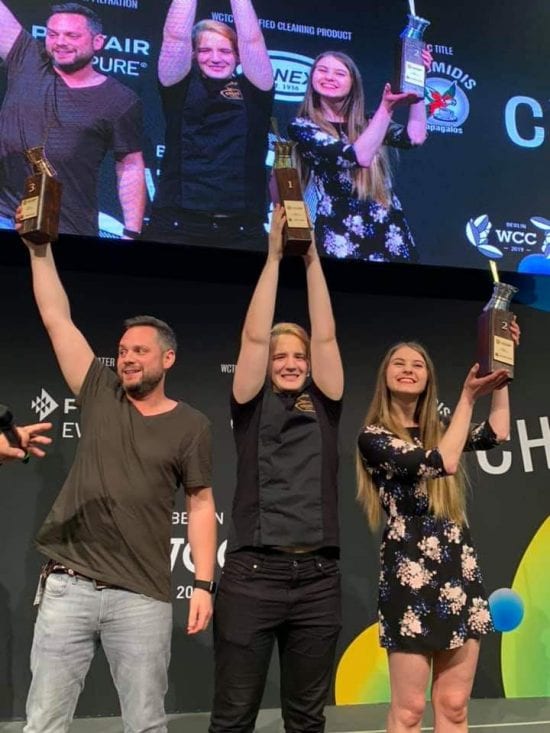
Katrina Yentch: You work for Cezve Coffee in Moscow. What was your experience in cezve/ibrik before taking part in this competition?
Sergey Blinnikov: In Russia, cezve is very popular. This method of brewing is familiar to almost everyone since the last century. Nowadays, every second person has cezve at home, or as it is called in Russia, “turka.” My family was no exception. At 7, I was a fan of coffee with condensed sweet milk. I made my first coffee in cezve from age 10-12. Naturally, neither my family nor I had heard of specialty coffee then, so I always added a lot of sugar and milk to it in order to reduce bitterness.
I became a barista at the age of 16, and after working with an espresso machine and alternative methods of brewing, I stopped paying attention to the cezve as an interesting device. Sometimes I would return to it to make my own little experiments with various additives and spices. When I bought a specialty coffee the first time, I tried some varieties in a cezve, but I always chose a V60 and a French press over cezve. I did not return to brewing cezve only until the moment when Marina Khuyppenen, our founder, took third place in the World Cezve/Ibrik Championship in 2017. This is what led me to the cezve coffee.
You are a cezve champion in Russia and now the world! Congratulations. How does it feel?
It’s Christmas! Of course, this is a great joy and responsibility. At first, I couldn’t even believe that I was in the top three, and when the second place was announced, nothing remained in me but excitement and emotions! Enough time has passed since our trip to Berlin, and the feelings are still fresh, and our team is still receiving congratulations! Our team has big plans for this victory. We hope that our example will help us to popularize the cezve and raise it as a specialty-coffee tool.
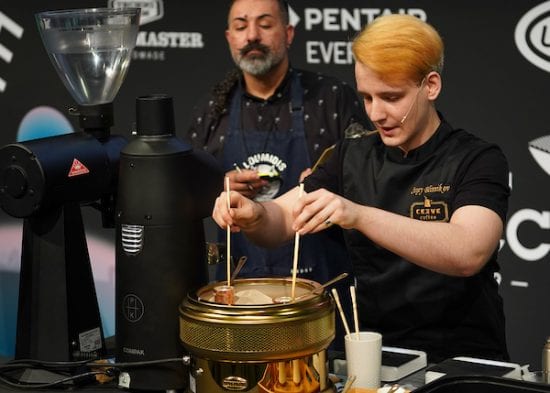
How did you prepare for the competition and come up with your award-winning recipe? The compressed cascara was a very interesting touch. Were you inspired by recipes at Cezve Coffee?
Our coffee shop has a huge assortment of signature drinks based on a cezve, and also there are almost all the drinks with which we participated in the Russian and world championships. Therefore, I am very lucky that I have the opportunity to work with complex drinks on the basis of cezve every day.
The preparation was very intensive and hard because for some time before going to Berlin, the coffee shop was overloaded with work. My trainer Anastasia Soroka and I could only meet in our free time. We used the same concept that we showed at the Russian championship. We just adjusted it with the recommendations of the judges. Therefore, we did not waste time on developing everything from scratch.
And the idea of the whole performance and the signature drink came to me absolutely by accident. Six months before the championship, the large roasting company Torrefacto brought coffee flowers to Russia for the first time. It was a new unique product that I really liked for its delicate and gentle taste. A little later, our green buyer Valentina Moksunova, while cleaning the roaster drew my attention to the bright aroma of silver skin, noting that it has a lot of potential as a product, although it is always utilized after roasting. And I immediately got the idea that, in fact, all the components of the coffee cherry are edible, and we can reconstruct the coffee cherry in the drink.
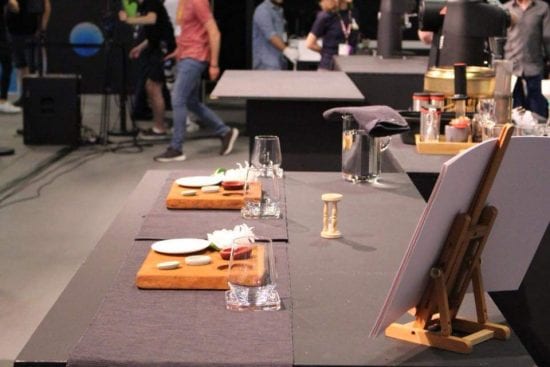
We used dried coffee flowers [from the Liberica species] in the drink and prepared them along with the rest of the ingredients right in the cezve. I was cooking cascara in sous-vide at a low temperature for almost two days. On the way out we got a very bright and acidic syrup. The silver skin is a very delicate product, so we used a portable espresso coffee maker, the Cafflano, in which we got a vivid essence under pressure. The whole beverage was filtered with a vacuum filter station to enhance synergy and highlight every ingredient.
And of course, the coffee—the most amazing coffee in my life. For all drinks, I used the Panamanian Gesha from the Ninety Plus Gesha Estate, lot Perci. This is a very well-known lot of coffee because it is one of the first to break the record of 97 points on a cupping table. Perci is an incredibly bright coffee that combines bright acidity and notes of dark chocolate and alcohol. It became the perfect coffee for the performance and this drink because of the main idea—coffee is more than we think!
Check back next week at Barista Magazine Online for the conclusion of our interview with Sergey.

